精通版英语五年级下册 Unit 3 知识清单
- 格式:doc
- 大小:62.50 KB
- 文档页数:3
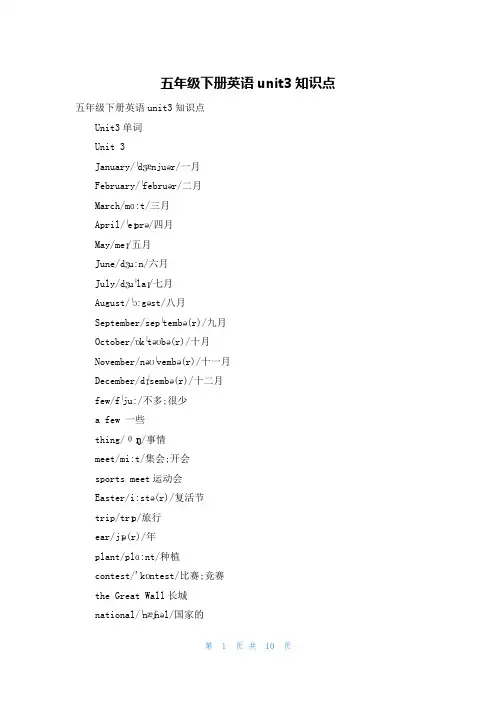
五年级下册英语unit3知识点五年级下册英语unit3知识点Unit3单词Unit 3January/ˈdʒænjuər/一月February/ˈfebruər/二月March/mɑ:t/三月April/ˈeɪprə/四月May/meɪ/五月June/dʒu:n/六月July/dʒuˈlaɪ/七月August/ˈɔ:gəst/八月September/sepˈtembə(r)/九月October/ɒkˈtəʊbə(r)/十月November/nəʊˈvembə(r)/十一月December/dɪˈsembə(r)/十二月few/fˈju:/不多;很少a few 一些thing/θɪŋ/事情meet/mi:t/集会;开会sports meet运动会Easter/i:stə(r)/复活节trip/trɪp/旅行ear/jɪə(r)/年plant/plɑ:nt/种植contest/'kɒntest/比赛;竞赛the Great Wall长城national/ˈnæʃnəl/国家的National Day 国庆日American/əˈmerɪkən/美国的Thanksgiving/ˌθæŋks'ɡɪvɪŋ/感恩节Christmas/ˈkrɪsməs/圣诞节holiday/ˈhɒlədeɪ/假日;节日game/geɪm/游戏roll/rəʊl/滚动look for寻找chocolate/ˈtʃɒklət/巧克力bunny/ˈbʌni/(用作儿语)兔子RSVP(尤用于请柬)请赐复by/baɪ/在……之前Unit3必考短语常用节假日名称:New Year’s Day元旦(1.1)Tree Planting Day 植树节(3.12)Easter 复活节Ap ril Fool’s Day愚人节(4.1)May Day 劳动节(5.1)Mother’s Day母亲节(每年五月的第二个星期天) Children’s Day 儿童节(6.1)Father’s Day父亲节(每年六月的第三个星期天) Teachers’ Day教师节(9.10)China’s National Day国庆节(10.1)Mid-Autumn Day 中秋节(农历八月十五)Thanks giving Day 感恩节(11月第4个周四)Christmas圣诞节(12.25)summer vacation暑假winter vacation寒假活动名称:sports meet 运动会Easter party 复活节聚会school trip 学校旅行Chinese test 语文测试singing contest歌唱比赛birthday party生日聚会Unit3必考句型1、问答某个活动或节日在几月份的句型及答复。
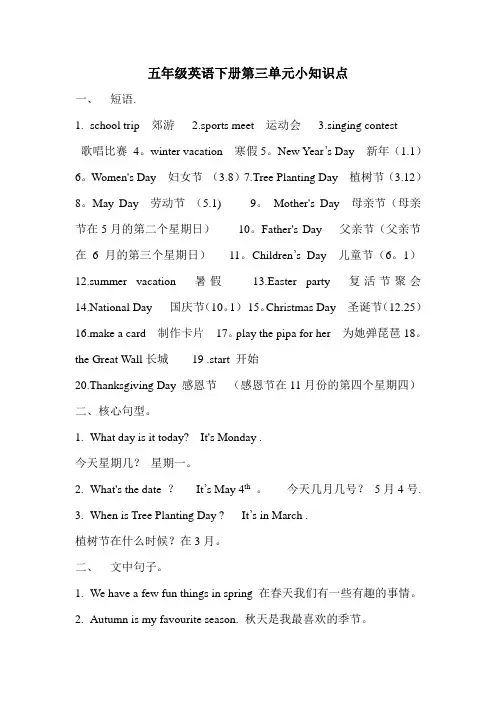
教科版小学科学四年级上册《身体的结构》教学反思《身体的结构》是小学科学四年级上册第四单元的第一课,鉴于四年级小朋友的心理和认知能力的特殊性,我对本课进行了精心设计,并将其作为教研课来上,以提高自身的教学能力和素质。
本科的重点是身体由哪些局部组成,以及认识人体的左右对称的特点。
难点是观察身体内部的器官。
为了突出重点,突破难点,我让学生围绕观察和体验开展探究,以小组合作为主要形式,借用课内活动激发学生的兴趣,充分发挥学生的主体作用。
课的一开始,我让学生回忆青蛙、蜗牛的结构特点,明确了动物的身体结构与它们的生活习性有很大的关系,同时划分昆虫的“头、胸、腹”三局部,为人体结构的划分做知识上的.准备。
在新课教学中,让学生划分人体结构时,我巧妙的运用课件和我自己的身体演示,使得同学们很快地将人的四个局部“头、颈、躯干、四肢”划分出来。
我在这根底上引导学生通过体验活动感受人体左右对称的好处。
让学生单手、双手系红领巾;单、双脚站立走路,引导他们发现人体的对称会使人类行动灵活、保持平衡。
同时整合思想品德教育,让学生们懂得用自己健全的身体做好自己的事情,去帮助那些身体上有残疾的人,献出我们的一片爱心,让世界充满爱。
在了解身体内部结构的设计上,我通过“摸袋子、猜一猜”等活动,让学生自然地转入到这一环节的探究中去。
学生通过摸、捏、摇、听等方法猜人体内部有什么?紧接着用人体内部结构模型和课件结合起来让学生观察,让学生有直观视觉和抽象的认识。
还将本来比拟抽象的身体分类及名称变得生动形象,容易记忆,以提高学生的学习兴趣。
学生们都很踊跃地参与进来,大家都在不知不觉中掌握了本课的重难点知识。
最后以“跳绳”活动让学生观察感受人体在运动时是否只是一个器官来完成。
学生通过小组合作填出了气泡图,分析出人体的工作不仅仅是一个运动器官能完成的,同时需要用多个系统来共同完成。
总的来说这节课是成功的,能较好地完成教学目标,巧妙的运用多种手段解决重难点。
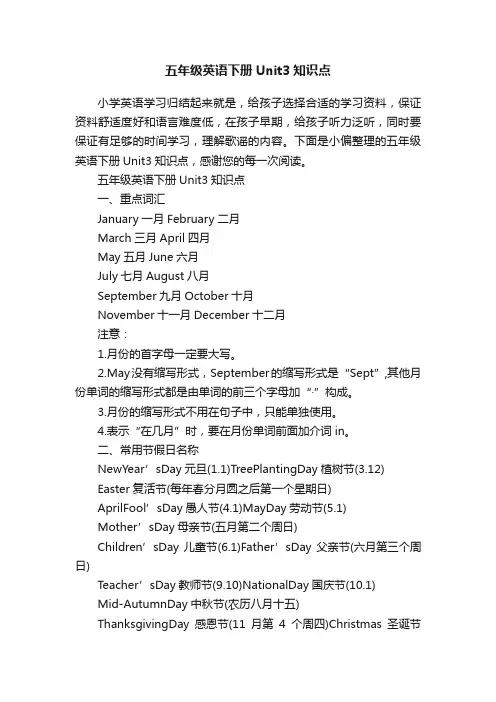
五年级英语下册Unit3知识点小学英语学习归结起来就是,给孩子选择合适的学习资料,保证资料舒适度好和语言难度低,在孩子早期,给孩子听力泛听,同时要保证有足够的时间学习,理解歌谣的内容。
下面是小偏整理的五年级英语下册Unit3知识点,感谢您的每一次阅读。
五年级英语下册Unit3知识点一、重点词汇January一月February二月March三月April四月May五月June六月July七月August八月September九月October十月November十一月December十二月注意:1.月份的首字母一定要大写。
2.May没有缩写形式,September的缩写形式是“Sept”,其他月份单词的缩写形式都是由单词的前三个字母加“·”构成。
3.月份的缩写形式不用在句子中,只能单独使用。
4.表示“在几月”时,要在月份单词前面加介词in。
二、常用节假日名称NewYear’sDay元旦(1.1)TreePlantingDay植树节(3.12)Easter复活节(每年春分月圆之后第一个星期日)AprilFool’sDay愚人节(4.1)MayDay劳动节(5.1)Mother’sDay母亲节(五月第二个周日)Children’sDay儿童节(6.1)Father’sDay父亲节(六月第三个周日)Teacher’sDay教师节(9.10)NationalDay国庆节(10.1)Mid-AutumnDay中秋节(农历八月十五)ThanksgivingDay感恩节(11月第4个周四)Christmas圣诞节(12.25)summervacation暑假(JulyandAugust)wintervacation寒假三、语音ch→[ts]:Chinachickenlunchteachersh→[s]:sheepfishshirtshorts四、活动名称sportsmeet运动会Easterparty复活节聚会schooltrip学校旅行Chinesetest语文测试singingcontest歌咏比赛birthdayparty生日聚会五、介词in、on、at的用法。
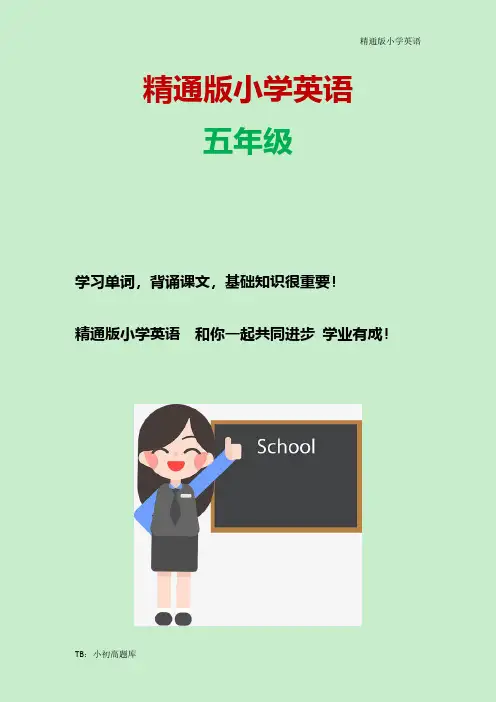
精通版小学英语五年级学习单词,背诵课文,基础知识很重要!精通版小学英语和你一起共同进步学业有成!Unit3 Fun Facts 教学设计一、教学内容与分析Reading for knowledge本部分通过阅读A litter Island,使学生对本单元所学的遵守规则的话题得到更好的拓展和延伸,通过学习,使学生能够读懂文章,根据文章选择正确的信息,并能够摘取文章重要信息进行复述。
指导阅读技巧,培养学生的自主学习能力。
二、课前准备1. 准备一个人们乱扔垃圾造成环境污染的视频文件,上课播放。
2. 准备词语卡片,进行复述。
3. 准备教学课件。
三、初学步骤与建议Step 1: Warm-up/Revision1)师生问好。
2)自由讨论:围绕本单元重点句型进行问答,结合学生实际生活讨论一下日常规则。
Step 2: Presentation1)播放人们乱扔垃圾造成环境污染的视频文件。
提出问题:这些垃圾都到哪里去了呢?引发学生思考,带着问题阅读文章。
2)阅读文章读前教师提出阅读文段后的前两个问题,让学生带着问题阅读。
阅读后,让学生讨论并回答问题。
Step 3: Practice1)Listen and repeat教师富有情感地领读短文,让学生认真模仿语音、语调、连读等。
同时模仿语气、表情等。
2)Read in different ways让学生独自朗读,然后伴有语气表情地进行朗读展示。
3)“分垃圾”活动教师让学生自己把不同的物品放到相应的垃圾桶,然后告诉学生答案:•黄色垃圾桶:cans•红色垃圾桶:glass bottles, plastic toys, plastic bottles•蓝色垃圾桶:newspapers, old booksStep 4: Language use分组讨论我们在日常生活中如何进行垃圾分类,怎样保护环境。
跟大家分享,可以查询资料。
Step 5: Assessment教师引导学生在真实的情景中运用所学的各种规则,并在真实情景、现实生活中灵活运用这些规则劝诫他人和指导自己。
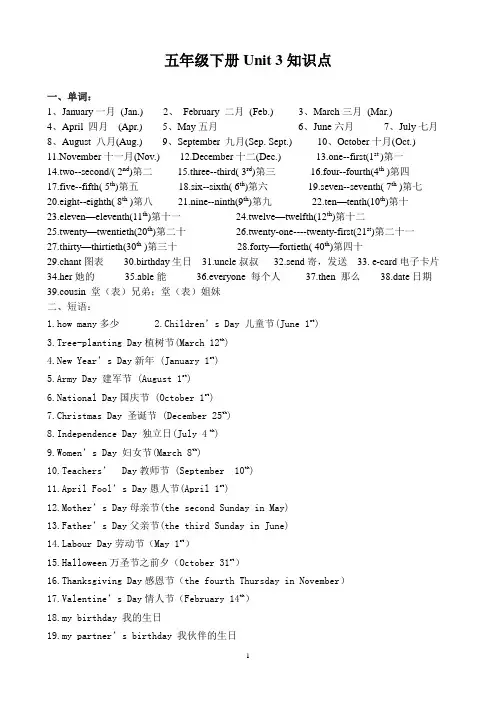
五年级下册Unit 3知识点一、单词:1、January一月(Jan.)2、February 二月(Feb.)3、March三月(Mar.)4、April 四月(Apr.)5、May五月6、June六月7、July七月8、August 八月(Aug.)9、September 九月(Sep. Sept.) 10、October十月(Oct.) 11.November十一月(Nov.) 12.December十二(Dec.) 13.one--first(1st )第一14.two--second/( 2nd)第二15.three--third( 3rd)第三16.four--fourth(4th )第四17.five--fifth( 5th)第五18.six--sixth( 6th)第六19.seven--seventh( 7th )第七20.eight--eighth( 8th )第八21.nine--ninth(9th)第九22.ten—tenth(10th)第十23.eleven—eleventh(11th)第十一24.twelve—twelfth(12th)第十二25.twenty—twentieth(20th)第二十26.twenty-one----twenty-first(21st)第二十一27.thirty—thirtieth(30th )第三十28.forty—fortieth( 40th)第四十29.chant图表30.birthday生日31.uncle叔叔32.send寄,发送33. e-card电子卡片34.her她的35.able能36.everyone 每个人37.then 那么38.date日期39.cousin 堂(表)兄弟;堂(表)姐妹二、短语:1.how many多少2.Child ren’s Day 儿童节(June 1st)3.Tree-planting Day植树节(March 12th)4.New Year’s Day新年 (January 1st)5.Army Day 建军节 (August 1st)6.National Day国庆节 (October 1st)7.Christmas Day 圣诞节 (December 25th)8.Independence Day 独立日(July 4 th)9.Women’s Day 妇女节(March 8th)10.Teachers’ Day教师节 (September 10th)11.April Fool’s Day愚人节(April 1st)12.Mother’s Day母亲节(the second Sunday in May)13.Father’s Day父亲节(the third Sunday in June)bour Day劳动节(May 1st)15.Halloween万圣节之前夕(October 31st)16.Thanksgiving Day感恩节(the fourth Thursday in November)17.Valentine’s Day情人节(February 14th)18.my birthday 我的生日19.my partner’s birthday 我伙伴的生日20.make a birthday chart 制作一张生日图表21.Uncle Bill’s birthday比利叔叔的生日22.send an e-card发送电子卡片 23.be able to 能够24.good idea 好主意 25. Summer vacation 暑假26.far away 远离三、句子:1.When is your birthday ? My birthday is in June.你在什么时候生日?我在六月份生日。
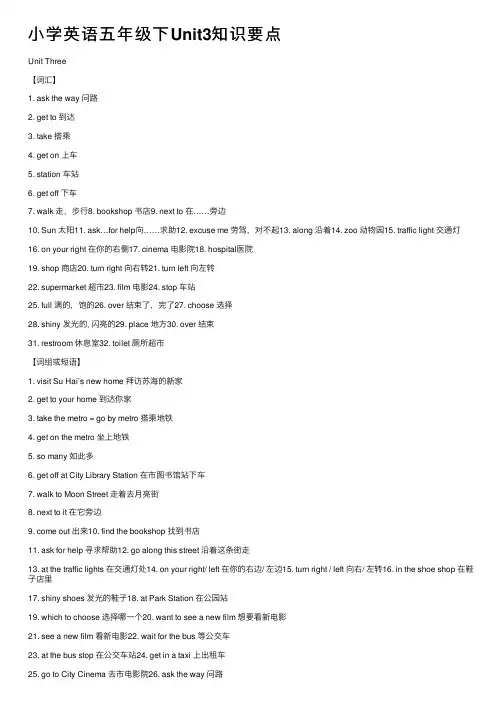
⼩学英语五年级下Unit3知识要点Unit Three【词汇】1. ask the way 问路2. get to 到达3. take 搭乘4. get on 上车5. station 车站6. get off 下车7. walk ⾛,步⾏8. bookshop 书店9. next to 在……旁边10. Sun 太阳11. ask…for help向……求助12. excuse me 劳驾,对不起13. along 沿着14. zoo 动物园15. traffic light 交通灯16. on your right 在你的右侧17. cinema 电影院18. hospital医院19. shop 商店20. turn right 向右转21. turn left 向左转22. supermarket 超市23. film 电影24. stop 车站25. full 满的,饱的26. over 结束了,完了27. choose 选择28. shiny 发光的, 闪亮的29. place 地⽅30. over 结束31. restroom 休息室32. toilet 厕所超市【词组或短语】1. visit Su Hai’s new home 拜访苏海的新家2. get to your home 到达你家3. take the metro = go by metro 搭乘地铁4. get on the metro 坐上地铁5. so many 如此多6. get off at City Library Station 在市图书馆站下车7. walk to Moon Street ⾛着去⽉亮街8. next to it 在它旁边9. come out 出来10. find the bookshop 找到书店11. ask for help 寻求帮助12. go along this street 沿着这条街⾛13. at the traffic lights 在交通灯处14. on your right/ left 在你的右边/ 左边15. turn right / left 向右/ 左转16. in the shoe shop 在鞋⼦店⾥17. shiny shoes 发光的鞋⼦18. at Park Station 在公园站19. which to choose 选择哪⼀个20. want to see a new film 想要看新电影21. see a new film 看新电影22. wait for the bus 等公交车23. at the bus stop 在公交车站24. get in a taxi 上出租车25. go to City Cinema 去市电影院26. ask the way 问路27. get to 到达28. See you later 再见29. Excuse me. 打扰⼀下30. on/ in the street 在街上31. walk along Sun Street 沿着太阳街⾛32. want to do sth. 想做某事33. go by bus = take the bus 坐汽车去34. The bus is full. 这车满了。
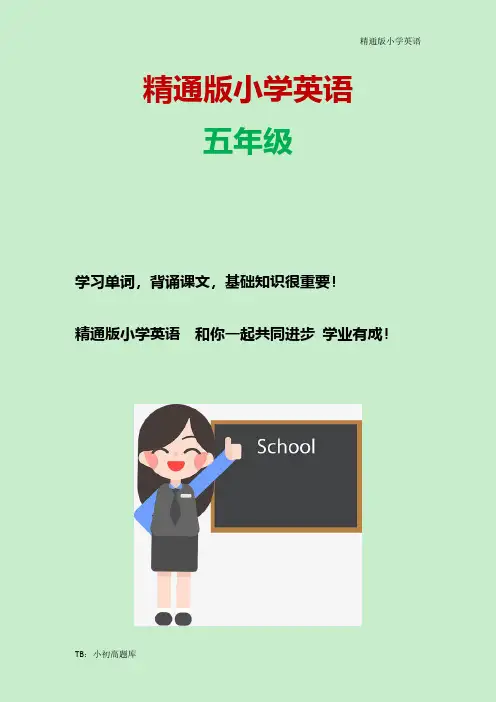
精通版小学英语五年级学习单词,背诵课文,基础知识很重要!精通版小学英语和你一起共同进步学业有成!Unit3 Revision 教学设计一、教学内容与分析1. Fun story (Read and act)本部分通过Fun story的形式,讲述了Mimi Micky和他们的小伙伴正在进行社会实践活动。
他们将自制的标语牌摆放在各个公共场所,提醒人们行为要文明。
然而,Micky刚刚将No littering!的标语牌插在花池旁边,就在吃香蕉时将香蕉皮随手乱丢,结果引来了小伙伴们的纷纷指责。
该部分以趣味小故事的形式,把各种社会规则再现,让学生在语境中复习巩固所学语言,提高综合语言运用能力。
2. Let’s check (Listen and number)本部分安排了听后排序的活动。
通过这一个活动,能检测和了解学生对本单元主要目标语言的掌握情况,以便教师及时反思并调整自己的教学。
3. Language focus本部分列出了本单元的目标语言知识。
教学中,通过设计丰富的活动,引导学生掌握听说认读的词句,以及听、说、读、写四会掌握的单词。
二、课前准备1. 准备一些规则标语的图片,奖励课堂上表现出色的学生。
2. 准备故事中出现的警示语,以备表演时使用。
3. 准备教学课件。
三、初学步骤与建议Step 1: Warm-up/Revision1)师生问好。
2)自由讨论。
教师让学生讨论如下问题:If I want to be a good boy/girl, what should I do at school/home/public places?Step 2: Presentation1)呈现情景。
出示故事的第一张图,让学生回答如下问题:Look at the picture. Who are they? What are the going to do?2)引入故事。
教师引出故事背景。
让学生回答问题。
T: They are going on a social study trip. Answer the following questions.Question 1: What sings do they have?(列举出小动物们准备的警示标语)Question 2: Where do they put the signs? Listen and match.(每名同学一张练习,见下图)让学生根据听到的内容连线,并读出相应的警示标语。
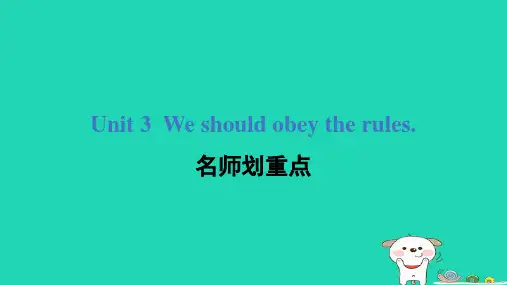
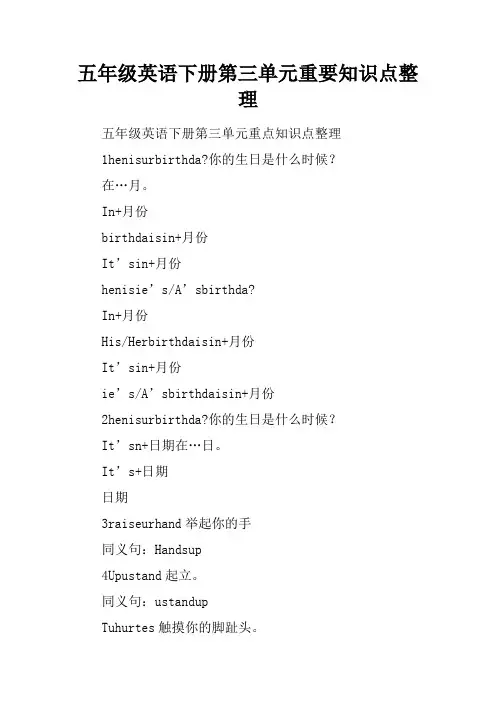
五年级英语下册第三单元重要知识点整理五年级英语下册第三单元重点知识点整理1henisurbirthda?你的生日是什么时候?在…月。
In+月份birthdaisin+月份It’sin+月份henisie’s/A’sbirthda?In+月份His/Herbirthdaisin+月份It’sin+月份ie’s/A’sbirthdaisin+月份2henisurbirthda?你的生日是什么时候?It’sn+日期在…日。
It’s+日期日期3raiseurhand举起你的手同义句:Handsup4Upustand起立。
同义句:ustandupTuhurtes触摸你的脚趾头。
名词,脚趾头,单数形式:te6中国节日农历节日:农历正月初一春节农历正月十五元宵节农历五月初五端午节农历七月初七乞巧节农历八月十五中秋节农历九月初九重阳节3月8日en’sDa妇女节(arhtheeighth)ar8th3月12日Tree-plantingDa植树节ar12th4月日清明节(Tb-seepingDa)Aprth月1日LabrDa劳动节(或aDa)a1st月4日中国青年节(hineseuthDa)a4th月12日国际护士节a12th6月1日hildren’sDa儿童节une1st8月1日ArDa建军节(Augustthefirst)Aug1st9月10日Teahers’Da教师节(Septeberthetenth)Sept10th0月1日NatinalDa国庆节(tberthefirst)t1st月1日Neear’sDa元旦De2thThansgivingDa感恩节(11月最后一个星期四美国感恩节,10月的第二个星斯一加拿大感恩节)ther’sDa母亲节(ther’sDaisthesendSundaina)月第二个星期日Father’sDa父亲节6月第三个星期日EasterDa复活节8Hanbirthdasarethereinanuar?一月份有多少生日?Therebe句型提问,要用Thereis/are…birthdasin…来回答。
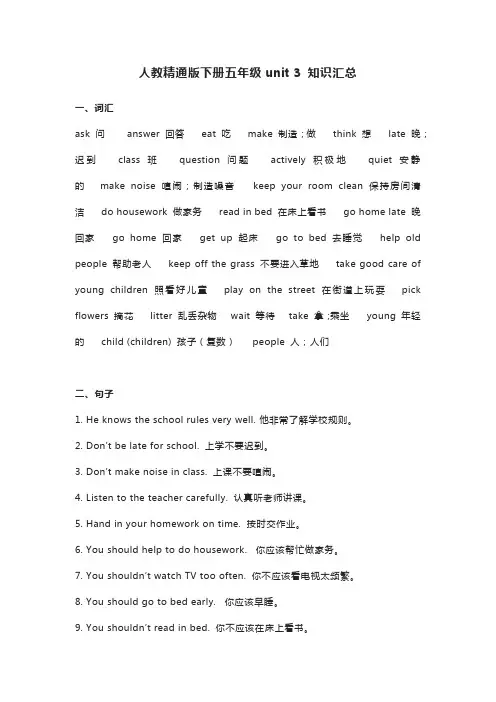
人教精通版下册五年级unit 3 知识汇总一、词汇ask 问answer 回答 eat 吃 make 制造;做 think 想 late 晚;迟到 class 班 question 问题 actively 积极地 quiet 安静的make noise 喧闹;制造噪音 keep your room clean 保持房间清洁 do housework 做家务 read in bed 在床上看书 go home late 晚回家 go home 回家 get up 起床 go to bed 去睡觉 help old people 帮助老人 keep off the grass 不要进入草地 take good care of young children 照看好儿童play on the street 在街道上玩耍pick flowers 摘花 litter 乱丢杂物wait 等待take 拿;乘坐 young 年轻的 child (children) 孩子(复数) people 人;人们二、句子1. He knows the school rules very well. 他非常了解学校规则。
2. Don’t be late for school. 上学不要迟到。
3. Don’t make noise in class. 上课不要喧闹。
4. Listen to the teacher carefully. 认真听老师讲课。
5. Hand in your homework on time. 按时交作业。
6. You should help to do housework. 你应该帮忙做家务。
7. You shouldn’t watch TV too often. 你不应该看电视太频繁。
8. You should go to bed early. 你应该早睡。
9. You shouldn’t read in bed. 你不应该在床上看书。
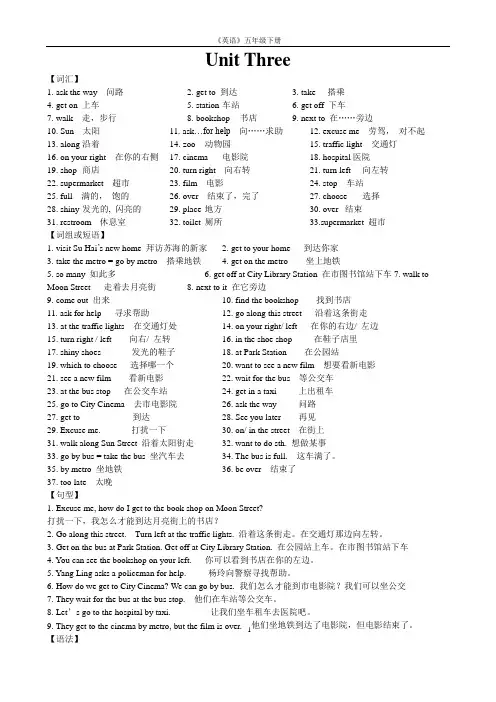
1Unit Three【词汇】1. ask the way 问路2. get to 到达3. take 搭乘4. get on 上车5. station 车站6. get off 下车7. walk 走,步行 8. bookshop 书店 9. next to 在……旁边10. Sun 太阳 11. ask …for help 向……求助 12. excuse me 劳驾, 对不起13. along 沿着 14. zoo 动物园 15. traffic light 交通灯16. on your right 在你的右侧 17. cinema 电影院 18. hospital 医院19. shop 商店 20. turn right 向右转 21. turn left 向左转22. supermarket 超市 23. film 电影 24. stop 车站25. full 满的, 饱的 26. over 结束了,完了 27. choose 选择28. shiny 发光的, 闪亮的 29. place 地方 30. over 结束31. restroom 休息室 32. toilet 厕所 33.supermarket 超市【词组或短语】1. visit Su Hai ’s new home 拜访苏海的新家2. get to your home 到达你家3. take the metro = go by metro 搭乘地铁4. get on the metro 坐上地铁5. so many 如此多6. get off at City Library Station 在市图书馆站下车7. walk to Moon Street 走着去月亮街8. next to it 在它旁边9. come out 出来 10. find the bookshop 找到书店11. ask for help 寻求帮助 12. go along this street 沿着这条街走13. at the traffic lights 在交通灯处 14. on your right/ left 在你的右边/ 左边15. turn right / left 向右/ 左转 16. in the shoe shop 在鞋子店里17. shiny shoes 发光的鞋子 18. at Park Station 在公园站19. which to choose 选择哪一个 20. want to see a new film 想要看新电影21. see a new film 看新电影 22. wait for the bus 等公交车23. at the bus stop 在公交车站 24. get in a taxi 上出租车25. go to City Cinema 去市电影院 26. ask the way 问路27. get to 到达 28. See you later 再见29. Excuse me. 打扰一下 30. on/ in the street 在街上31. walk along Sun Street 沿着太阳街走 32. want to do sth. 想做某事33. go by bus = take the bus 坐汽车去 34. The bus is full. 这车满了。
Unit 3 We should obey the rules Lesson 13教学设计一、教材内容分析本课时学生要学习的内容是小学英语(精通英语)五年级下册第三单元第二课时,主要包括just practice, just write, let’s act 和let’s chant四个环节。
主要的目标语言有Listen to the teacher carefully. Don’t be late for class/school. Ask and answer questions actively. Be quiet. Don’t make noise in class.教学中,尽量设置真实的情境,联系学校实际,通过谈论、展现学生日常生活中会经常遇到的一些行为,并分辨好的行为和不良行为,通过小组活动的形式引导学生形成对客观世界的正确认识。
语音部分的学习要充分利用教材中提供的chant,通过不同形式的活动让学生感知,体验,领悟,学习,练习,从而初步掌握字母在单词中的发音规律,并将规律运用到规则单词的拼读上。
二、学生情况分析通过之前的对话学习,学生已经具备了一定的英语对话基础。
绝大数学生能够较流利的朗读对话,本节课中所涉及的句型、词汇,他们也都有了一定的感知。
所以教学中重点是要创设情景,帮助学生理解并巩固、运用本节课的句型,同时进行语句的扩展,给学生提供更多的语言素材,提高学生在相关话题背景下的交际能力。
也进一步激发和鼓励学生在学习中敢于表达,乐于合作。
三、教学目标知识目标:1.能听、说、读本课目标语言:Listen to the teacher carefully. Don’t be late for class/school. Ask and answer questions acti vely. Be quiet. Don’t make noise in class.2.能听、说、读、写下列单词:ask, answer, eat, make, think, late, class, school.3.能有节奏的朗读含有i在重读开音节单词中发音的歌谣;能够辨别和识记字母i 在重读开音节单词中的发音。
五年级下册英语unit3知识点五年级下册英语unit3知识点Unit3单词Unit 3January/ d nju r/一月February/ febru r/二月March/mɑ:t/三月April/ e pr /四月May/me /五月June/d u:n/六月July/d u la /七月August/ :g st/八月September/sep temb (r)/九月October/ k t b (r)/十月November/n vemb (r)/十一月December/d semb (r)/十二月few/f ju:/不多;很少a few 一些thing/ /事情meet/mi:t/集会;开会sports meet运动会Easter/i:st (r)/复活节trip/tr p/旅行ear/j (r)/年plant/plɑ:nt/种植contest/ k ntest/比赛;竞赛the Great Wall长城national/ n n l/国家的National Day 国庆日American/ mer k n/美国的Thanksgiving/ ks ɡv /感恩节Christmas/ kr sm s/圣诞节holiday/ h l de /假日;节日game/ge m/游戏roll/r l/滚动look for寻找chocolate/ t kl t/巧克力bunny/ b ni/(用作儿语)兔子RSVP(尤用于请柬)请赐复by/ba /在之前Unit3必考短语常用节假日名称:New Year s Day元旦(1.1) Tree Planting Day 植树节(3.12) Easter 复活节April Fool s Day愚人节(4.1)May Day 劳动节(5.1)Mother s Day母亲节(每年五月的第二个星期天) Children s Day 儿童节(6.1)Father s Day父亲节(每年六月的第三个星期天) Teachers Day教师节(9.10)China s National Day国庆节(10.1)Mid-Autumn Day 中秋节(农历八月十五) Thanks giving Day 感恩节(11月第4个周四) Christmas圣诞节(12.25)summer vacation暑假winter vacation寒假活动名称:sports meet 运动会Easter party 复活节聚会school trip 学校旅行Chinese test 语文测试singing contest歌唱比赛birthday party生日聚会Unit3必考句型1、问答某个活动或节日在几月份的句型及回答。
五年级下册英语第三单元知识整理Unit 3: AnimalsKey Vocabulary1. Mammals: Animals that give birth to live young, have hair or fur, and produce milk to feed their babies. Example: dog, cat, elephant.2. Reptiles: Animals that have dry, scaly skin and lay eggs. Example: snake, turtle, lizard.3. Amphibians: Animals that live both on land and in water. They lay eggs in water. Example: frog, toad, salamander.4. Birds: Animals with feathers, wings, and beaks. They lay eggs. Example: eagle, penguin, parrot.5. Fish: Animals that live in water, breathe through gills, and have fins and scales. Example: goldfish, shark, tuna.6. Insects: Animals with six legs, three body parts, and usually wings. Example: butterfly, ant, bee.Key Sentences1. What is this?- This is a mammal.2. Is it a reptile?- No, it's not a reptile. It's a bird.3. Can it fly?- Yes, it can fly. It's a bird.4. Does it lay eggs?- No, it doesn't lay eggs. It's a mammal.5. Where does it live?- It lives in the water. It's a fish.Activities1. Match the animals with their classifications (mammals, reptiles, amphibians, birds, fish, insects).2. Draw and color different animals from each classification.3. Write a short paragraph describing your favorite animal and why you like it.4. Research and present information about a specific animal to the class.Songs and Chants1. "The Animal Song"(To the tune of "Mary Had a Little Lamb")Mammals, reptiles, amphibians,Birds and fish, insects too.These are all the animal groups,And here are some for you!2. "The Animal Hokey Pokey"Put your wings in,Take your wings out,Put your wings in,And fly all about!Do the hokey pokeyAnd turn around,That's what it's all about!By studying Unit 3: Animals, students will gain a better understanding of different animal classifications, characteristics, and behaviors. They will also improve their vocabulary, sentence structure, and communication skills in English.。
五下Unit3知识点总结姓名:___________一、重点短语:1、上地铁get on the metro 下地铁get off the metro2、到达get to 走到…walk to 在…旁边next to3、等待wait for 好的all right 劳驾;对不起excuse me4、太晚了too late 在你右边/左边on your right/left5、去电影院go to the cinema 看电影see/watch a film6、公交车满了the bus is full 电影结束了the film is over7、沿着这条街走Go/walk along this street8、从…站出来c ome out from…Station9、向一个警察求助ask a policeman for help10、在交通灯处向右转turn right at the traffic lights二、重要用法总结:1、到达学校:get to school到达你的家:get to your home到家:get home到这:get here到那:get there注意:get to 后直接跟home/here/there时,省略to2、policeman的复数为:policemen三、重点语法:1、介词的使用:在…大街,用on on Sun Street在大街上,用in in the street在…城镇,用in in Sunshine Town在…站,用at at Park Station在汽车站,用at at the bus stop在交通灯处,用at at the traffic lights在你的左边或右边,用on on your left/right2、对交通方式提问用How3、步行go to sp on foot = walk to sp骑自行车by bike = ride a bike乘公交/出租车/火车/轮船/地铁/小汽车/飞机by+交通工具(放句末)= take a/the +交通工具(放句中)by bus/taxi/train/ship/metro/car/plane (放句末)= take a/the bus/taxi/train/ship/metro/car/plane (放句中)。
Unit We should obey the rules.一、核心词汇1.动词ask问answer回答eat吃make制造;做think想wait等待take拿;乘坐2.形容词late晚;迟到young年轻的3.名词class班school学校people人;人们child (children)孩子(复数)4.短语dohousework 做家务gohome回家getup起床gotobed去睡觉二、拓展词汇1.动词litter乱丢杂物2.名词question问题3.形容词、副词quiet安静的actively积极地4.短语makenoise喧闹;制造噪音keepyourroomclean保持房间清洁readinbed在床上看书gohomelate晚回家helpoldpeople帮助老人keepoffthegrass不要进入草地takegoodcareofyoungchildren照看好儿童playonthestreet在街道上玩耍pickflowers摘花三、核心句型1. Listen to the teacher carefully. 认真听老师(讲课)。
解读:这是Do型祈使句句型。
举一反三: Put your English book on the desk. 把你的英语书放在课桌的上面。
2. Don’t be late for class/school. 上课/上学不要迟到。
解读:这是否定祈使句句型。
举一反三: Don’t be late for our party. 我们的聚会你不要迟到。
3.You should go to bed early. 你应该早点儿去睡觉。
解读:这是表达某人应该做某事的句型。
举一反三: We should obey the school rules. 我们应该遵守学校规则。
4. You shouldn’t read in bed. 你不应该在床上看书。
解读:这是表达某人不应该做某事的句型。
Unit We should obey the rules.
一、核心词汇
1.动词
ask问answer回答eat吃make制造;做
think想wait等待take拿;乘坐
2.形容词
late晚;迟到young年轻的
3.名词
class班school学校people人;人们child (children)孩子(复数)
4.短语
dohousework 做家务gohome回家getup起床gotobed去睡觉
二、拓展词汇
1.动词
litter乱丢杂物
2.名词
question问题
3.形容词、副词
quiet安静的actively积极地
4.短语
makenoise喧闹;制造噪音keepyourroomclean保持房间清洁readinbed在床上看书gohomelate晚回家helpoldpeople帮助老人keepoffthegrass不要进入草地takegoodcareofyoungchildren照看好儿童playonthestreet在街道上玩耍pickflowers摘花
三、核心句型
1. Listen to the teacher carefully. 认真听老师(讲课)。
解读:这是Do型祈使句句型。
举一反三: Put your English book on the desk. 把你的英语书放在课桌的上面。
2. Don’t be late for class/school. 上课/上学不要迟到。
解读:这是否定祈使句句型。
举一反三: Don’t be late for our party. 我们的聚会你不要迟到。
3.You should go to bed early. 你应该早点儿去睡觉。
解读:这是表达某人应该做某事的句型。
举一反三: We should obey the school rules. 我们应该遵守学校规则。
4. You shouldn’t read in bed. 你不应该在床上看书。
解读:这是表达某人不应该做某事的句型。
举一反三: We shouldn’t go out to play now.我们现在不应该出去玩。
5. You must wait for the green light. 你应该等待绿灯。
解读:这是表达某人必须做某事的句型。
举一反三: We must hand in our homework on time. 我们必须按时交作业。
6. You mustn’t cross the street when the light is red. 红灯时,你不能过马路。
解读:这是表达某人不允许做某事的句型。
举一反三: You mustn’t make noise in class. 在课堂上你不能喧闹。
四、了解句型
1. Hand in your homework on time. 准时交作业。
解读:这是一个Do型祈使句。
hand in的意思是“上交”, on time 的意思是“准时”。
2. Ask and answer questions actively. 积极提问和回答问题。
解读:这是一个Do型祈使句。
ask和answer是并列动作,故用and 连接。
3. He doesn’t like to do housework. 他不喜欢做家务。
解读:这是表达某人不喜欢做某事的句型。
doesn’t是does not的缩略形式,to do housework 是动词不定式短语,作目的状语。
4. He watches TV too often. 他看电视太频繁。
解读:这是一个陈述句。
watches是watch的第三人称单数形式, too often的意思是“太频繁”,副词too修饰频度副词often。